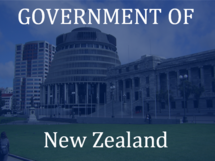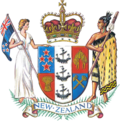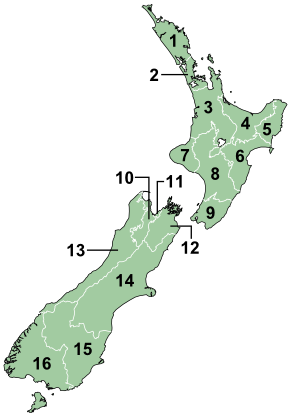New Zealand House of Representatives
| New Zealand | |
 This article is part of the series: |
|
|
|
|
|
Executive (The Crown)
Elections
General
|
|
|
Other countries · Atlas |
|
| Parliament of New Zealand | |
| 49th New Zealand Parliament | |
 |
|
| Type | |
|---|---|
| Type | Unicameral |
| Houses | House of Representatives |
| Leadership | |
| Speaker of the House of Representatives | Lockwood Smith, National Party since 9 December, 2008 |
| Leader of the House of Representatives | Gerry Brownlee, National Party since 9 December, 2008 |
| Structure | |
| Members | 120 Representatives |
| Election | |
| Meeting place | |
| Parliament House, Wellington, New Zealand | |
| Web site | |
| www.parliament.nz/en-NZ | |
The New Zealand House of Representatives is the legislature of New Zealand. The House and the Queen of New Zealand form the New Zealand Parliament.
The House of Representatives is a democratically elected body, usually consisting of 120 members (currently 122 due to an overhang) known as Members of Parliament. Members are elected for limited terms, holding office until Parliament is dissolved (a maximum of three years).
New Zealand essentially follows the Westminster system of government, and is governed by a cabinet and Prime Minister chosen by the House of Representatives.
The House of Representatives was established by the British New Zealand Constitution Act 1852 which established a bicameral legislature, but the upper house, the Legislative Council, was abolished in 1951 so Parliament is now unicameral. Parliament received full control over all New Zealand affairs in 1947 with the passage of the Statute of Westminster Adoption Act.
Contents |
Title
The official title of the New Zealand House of Representatives was originally the General Assembly until 1986 when it became the New Zealand House of Representatives. It is commonly, but incorrectly, referred to as "Parliament" (the term "Parliament" encompasses both the monarch and the House of Representatives).
Members of Parliament
The House of Representatives takes the British House of Commons as its model. It normally consists of 120 members, known as "Members of Parliament" (MPs). They were known as "Members of the House of Representatives" (MHRs) until the passing of the Parliamentary and Executive Titles Act 1907 when New Zealand became a dominion. The House of Representatives meets in Parliament House in Wellington. Seats in the debating chamber form a horseshoe pattern, with members of the governing party or coalition sitting on the right hand of the Speaker and members of the opposition sitting opposite. The Speaker of the House of Representatives acts as the presiding officer.
The executive branch of the New Zealand government (the Cabinet) draws its membership exclusively from the House of Representatives, based on which party or parties can claim a majority. The Prime Minister (PM) leads the government: the Governor-General appoints the Prime Minister from a party or coalition which appears to have enough support in the House to govern. This support is immediately tested through a Motion of Confidence. The current government is a coalition between the National Party, ACT Party, United Future and the Maori Party; the Prime Minister is John Key. The Leader of the Opposition is the leader of the largest opposition party. Currently the Leader of the Opposition is Phil Goff of the Labour Party.
For information on current members of Parliament, see 49th New Zealand Parliament. We are still awating final results to be publised.
Elections
- See: Electoral system of New Zealand
Election to the House is by the Mixed Member Proportional (MMP) electoral system, which provides for proportional representation. The MMP system means that there are usually several parties present in the House — at present, there are eight. The MMP system replaced the old "first-past-the-post" system after a referendum in 1993. The first MMP vote was at the 1996 election.
Last election results
| party | votes | % of votes | seats | |||||
|---|---|---|---|---|---|---|---|---|
| % | change | electorate | list | total | change | |||
| National | 1,053,398 | 44.93 | +5.83 | 41 | 17 | 58 | +10 | |
| Labour | 796,880 | 33.99 | -7.11 | 21 | 22 | 43 | -7 | |
| Green | 157,613 | 6.72 | +1.42 | 0 | 9 | 9 | +3 | |
| ACT | 85,496 | 3.65 | +2.14 | 1 | 4 | 5 | +3 | |
| Māori | 55,980 | 2.39 | +0.27 | 5 | 0 | 5 | +1 | |
| Progressive | 21,241 | 0.91 | -0.25 | 1 | 0 | 1 | 0 | |
| United Future | 20,497 | 0.87 | -1.80 | 1 | 0 | 1 | -2 | |
| other parties | 153,461 | 6.51 | +5.32 | 0 | 0 | 0 | -7a | |
| total | 2,344,566 | 100.00 | 70 | 52 | 122 | +1 | ||
| party informal votes | 11,970c | |||||||
| disallowed special votes | 19,517c | |||||||
| disallowed ordinary votes | 427c | |||||||
| total votes cast | 2,376,480 | |||||||
| turnout | 79.46%b | |||||||
a The loss of seven seats by 'other parties' shown here compared to the 2005 election result was entirely due to NZ First failing to clear the MMP threshold. Two independents, Gordon Copeland and Taito Phillip Field, who split from their parties since the 2005 election have also lost their seats.
bThe turnout is given as a percentage of those enrolled to vote. "New Zealand General Election 2008 - Official Results". Elections New Zealand. Retrieved on 2008-11-23.
c"Party Votes and Turnout by Electorate". Chief Electoral Office, New Zealand Ministry of Justice. Retrieved on 2008-11-29.
See also New Zealand general election, 2008
Passage of legislation
The New Zealand Parliament's model for passing Acts of Parliament is similar (but not identical) to that of other Westminster System governments.
Laws are initially proposed to the House of Representatives as bills. They become Acts after being approved three times by House votes and then receiving the Royal Assent from the Governor-General. The majority of bills are promulgated by the government of the day (that is, the party or parties that have a majority in the House). It is rare for government bills to be defeated, indeed the first to be defeated in the twentieth century was in 1998. It is also possible for individual MPs to promote their own bills, called member's bills — these are usually put forward by opposition parties, or by MPs who wish to deal with a matter that parties do not take positions on. Local government and private individuals (for $2000 and only affecting themselves) may also bring forward legislation.
Proxy voting is allowed, in which members may designate a party or another member to vote on their behalf. An excuse is required.[1]
First Reading
The first stage of the process is the First Reading. The MP introducing the bill (often a minister) will give a detailed speech on the bill as a whole. Debate on the bill generally lasts two hours, with 12 MPs making ten-minute speeches (although they can split their speaking time with another MP) on the bill's general principles. Speaking slots are allocated based on the size of each party, with different parties using different methods to distribute their slots among their MPs.
The MP introducing the bill will generally make a recommendation that the bill be considered by an appropriate Select Committee (see below). Sometimes, it will be recommended that a special Committee be formed, usually when the bill is particularly important or controversial. The House then votes as to whether the bill should be sent to the Committee for deliberation. It is not uncommon for a bill to be voted to the Select Committee stage even by parties which do not support it — since Select Committees can recommend amendments to bills, parties will often not make a final decision on whether to back a bill until the Second Reading.
Select Committee stage
The Select Committee will scrutinise the bill, going over it in more detail than can be achieved by the whole membership of the House. The public can also make submissions to Select Committees, offering support, criticism, or merely comments. The Select Committee stage is seen as increasingly important today — in the past, the governing party generally dominated Select Committees, making the process something of a rubber stamp, but in the multi-party environment there is significant scope for real debate. Select Committees frequently recommended changes to bills, with prompts for change coming from the MPs on the Committee, officials who advise the Committee, and members of the public. When a majority of the Committee is satisfied with the bill, the Committee will report back to the House on it. Unless Parliament grants an extension, the time limit for Select Committee deliberations is six months or whatever deadline was set by the House when the bill was referred.
Second Reading
The Second Reading, like the first, generally consists of a two-hour debate in which MPs make ten-minute speeches. Again, speaking slots are allocated to parties based on their size. In theory, speeches should relate to the principles and objects of the bill, and also to the consideration and recommendations of the Select Committee and issues raised in public submissions. Parties will usually have made their final decision on a bill after the Select Committee stage, and will make their views clear during the Second Reading debates. At the conclusion of the Second Reading debate, the House votes on whether to accept any amendments recommended by the Select Committee by majority (unanimous amendments are not subjected to this extra hurdle).
The Government (usually through the Minister of Finance) has the power (given by the House's Standing Orders) to veto any bill (or amendment to a bill) that would have a major impact on the Government's budget and expenditure plans. This veto could be invoked at any stage of the process, but if applied to a bill as a whole would most likely be employed at the Second Reading stage. This has not occurred since the veto power was introduced in 1996, although many amendments have been vetoed at the Committee of the whole House stage (see below).
If a bill receives its Second Reading, it goes on to be considered by a Committee of the whole House.
Committee of the whole House
When a bill reaches the Committee of the whole House stage, the House resolves itself "Into Committee", that is, it forms a committee consisting of all MPs (as distinct from a Select Committee, which consists only of a few members). When the House is "In Committee", it is able to operate in a slightly less formal way than usual.
During the Committee of the whole House stage, a bill is debated in detail, usually "part by part" (a "part" is a grouping of clauses). MPs may make five-minute speeches on a particular part or provision of the bill and may propose further amendments, but theoretically should not make general speeches on the bill's overall goals or principles (that should have occurred at the Second Reading).
Sometimes a member may advertise his or her proposed amendments beforehand by having them printed on a "Supplementary Order Paper". This is common for amendments proposed by government Ministers. Some Supplementary Order Papers are very extensive, and, if agreed to, can result in major amendments to bills. On rare occasions, Supplementary Order Papers are referred to Select Committees for comment.
The extent to which a bill changes during this process varies. If the Select Committee that considered the bill did not have a government majority and made significant alterations, the Government may make significant "corrective" amendments. There is some criticism that bills may be amended to incorporate significant policy changes without the benefit of Select Committee scrutiny or public submissions, or even that such major changes can be made with little or no notice. However, under the MMP system when the Government is less likely to have an absolute majority, any amendments will usually need to be negotiated with other parties to obtain majority support.
The Opposition may also put forward wrecking amendments. These amendments are often just symbolic of their contrasting policy position, or simply intended to delay the passage of the bill through the sheer quantity of amendments for the Committee of the whole House to vote on.
Third Reading
The final Reading takes the same format as the First and Second Readings — a two-hour debate with MPs making ten-minute speeches. The speeches once again refer to the bill in general terms, and represent the final chance for debate. A final vote is taken. If a bill passes its third reading, it is passed on to the Governor-General, who will (assuming constitutional conventions are followed) give it Royal Assent as a matter of course. It then becomes law.
Select Committees
Legislation is scrutinised by Select Committees. The Committees can call for submissions from the public, thereby meaning that there is a degree of public consultation before a parliamentary bill proceeds into law. The strengthening of the Committee system was in response to concerns that legislation was being forced through, without receiving due examination and revision. Each Select Committee has a Chairperson and a Deputy Chairperson. MPs may be members of more than one Select Committee.
For the 48th Parliament, which finished with the 2008 general election in November 2008, there were 18 Select Committees in the House of Representatives, as follows:
| Select Committee | Members (Roles) |
|---|---|
| Business | |
| Commerce | |
| Education and Science | |
| Finance and Expenditure | |
| Foreign Affairs, Defence and Trade | |
| Government Administration | |
| Health | |
| Justice and Electoral | |
| Law and Order | |
| Local Government and Environment | |
| Māori Affairs | |
| Officers of Parliament | |
| Primary Production | |
| Privileges |
|
| Regulations Review | |
| Social Services | |
| Standing Orders | |
| Transport and Industrial Relations |
-
- Members of the select committees April 12, ....
Occasionally a special Select Committee will be created on a temporary basis. An example was the Select Committee established to study the foreshore and seabed bill.
Other functions
The House also has several other important functions.
- Questions may be asked of Ministers, select committee chairs, and members in charge of bills every sitting day.
See also
- Constitution of New Zealand
- Parliament of New Zealand
- Category:New Zealand House of Representatives accredited news organisations
References
- ↑ "Standing Orders of the House of Representatives". New Zealand House of Representatives (2005-08-12). Retrieved on 2008-02-19.

